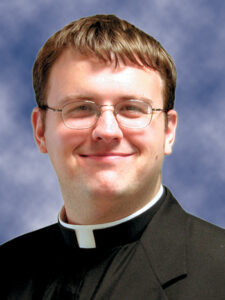 Dear Parishioners,
Dear Parishioners,
In this Sunday’s reading, John the Baptist testifies that Christ is the Lamb of God. You may be wondering why John gives Jesus this title since a lamb does not seem to be that great of an animal in the grand scheme of things. It is not known for being brave, strong or noble.
To understand the roots of this title, we need to recall the events of the Book of Exodus. In this Book, the people of Israel are enslaved in Egypt and God sends Moses to get Pharaoh to free them. Pharaoh refuses and so God sends a series of plagues culminating with the Angel of Death who kills all the first born sons in the country. The only families who were spared a visit from this angel were those who put an unblemished Lamb’s blood over their doorposts. This event is still celebrated in the Jewish holiday of Passover because the Angel of Death passed over those homes. It is because this lamb died that the people were eventually set free and they were able to enter the promised land.
What does this have to do with Jesus? Jesus is the fulfillment of what this Lamb symbolizes. The Lamb of Passover was an unblemished lamb. Christ is man in all ways, except he never sinned. The lamb died in order to set the people free from slavery. Our Lord died so that we could be saved from sin. Jesus was crucified at Noon on the day of Passover. This was the same hour that the lambs were being sacrificed at the temple. Also, when He died, none of His bones were broken. This is also true of the lamb of sacrifice. So, it is very evident that the Gospel writers were making a strong connection between our Lord and the lamb. The symbolism of the lamb comes in full force in the Book of Revelation where Jesus is called “the Lamb who was slain” and the climax of the book is the “wedding feast of the Lamb.”
This connection is why we sing at mass the “Lamb of God” and why the priest says, “Behold the Lamb of God” before receiving communion. It is because of Christ’s sacrifice that we can have the sacrament of the Eucharist. We are invited to the Eucharist just as we are invited to the wedding feast of the Lamb in heaven. In ancient times, sacrifices were eaten by the people. So, likewise, when we receive communion we are receiving Our Lord who sacrificed Himself for us.
God bless,
Fr. Carter



